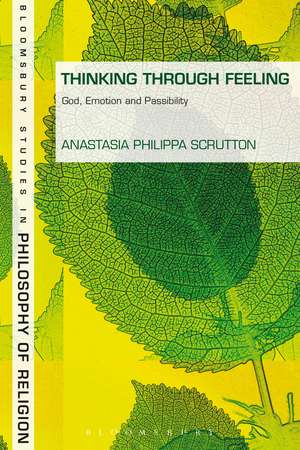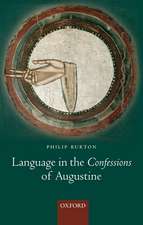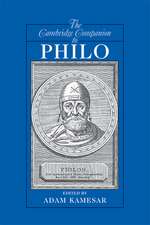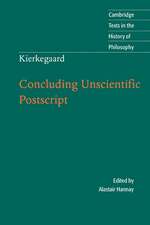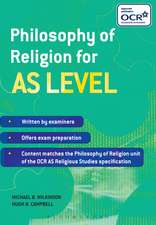Thinking Through Feeling: God, Emotion and Passibility: Bloomsbury Studies in Philosophy of Religion
Autor Dr Anastasia Philippa Scruttonen Limba Engleză Paperback – 22 mai 2013
| Toate formatele și edițiile | Preț | Express |
|---|---|---|
| Paperback (1) | 257.03 lei 6-8 săpt. | |
| Bloomsbury Publishing – 22 mai 2013 | 257.03 lei 6-8 săpt. | |
| Hardback (1) | 831.43 lei 6-8 săpt. | |
| Bloomsbury Publishing – 7 dec 2011 | 831.43 lei 6-8 săpt. |
Din seria Bloomsbury Studies in Philosophy of Religion
- 30%
 Preț: 527.07 lei
Preț: 527.07 lei - 22%
 Preț: 224.66 lei
Preț: 224.66 lei - 19%
 Preț: 191.38 lei
Preț: 191.38 lei - 13%
 Preț: 254.19 lei
Preț: 254.19 lei - 22%
 Preț: 232.90 lei
Preț: 232.90 lei - 12%
 Preț: 234.38 lei
Preț: 234.38 lei -
 Preț: 258.42 lei
Preț: 258.42 lei - 13%
 Preț: 255.84 lei
Preț: 255.84 lei - 13%
 Preț: 224.58 lei
Preț: 224.58 lei - 31%
 Preț: 830.20 lei
Preț: 830.20 lei - 22%
 Preț: 257.50 lei
Preț: 257.50 lei -
 Preț: 259.42 lei
Preț: 259.42 lei -
 Preț: 254.93 lei
Preț: 254.93 lei - 21%
 Preț: 216.52 lei
Preț: 216.52 lei - 23%
 Preț: 190.50 lei
Preț: 190.50 lei - 23%
 Preț: 192.30 lei
Preț: 192.30 lei - 23%
 Preț: 191.22 lei
Preț: 191.22 lei
Preț: 257.03 lei
Nou
Puncte Express: 386
Preț estimativ în valută:
49.18€ • 51.50$ • 40.79£
49.18€ • 51.50$ • 40.79£
Carte tipărită la comandă
Livrare economică 10-24 aprilie
Preluare comenzi: 021 569.72.76
Specificații
ISBN-13: 9781623560713
ISBN-10: 1623560713
Pagini: 240
Ilustrații: black & white illustrations
Dimensiuni: 156 x 234 x 13 mm
Greutate: 0.34 kg
Editura: Bloomsbury Publishing
Colecția Bloomsbury Academic
Seria Bloomsbury Studies in Philosophy of Religion
Locul publicării:New York, United States
ISBN-10: 1623560713
Pagini: 240
Ilustrații: black & white illustrations
Dimensiuni: 156 x 234 x 13 mm
Greutate: 0.34 kg
Editura: Bloomsbury Publishing
Colecția Bloomsbury Academic
Seria Bloomsbury Studies in Philosophy of Religion
Locul publicării:New York, United States
Caracteristici
Contributes to the impassibility debate in contemporary theology and philosophy of religion by providing a less simplistic account of both impassibility and emotion.
Notă biografică
Anastasia Philippa Scrutton is Frederick J. Crosson Research Fellow at the Center for Philosophy of Religion, University of Notre Dame, USA.
Cuprins
Acknowledgments / Introduction / Chapter One: Historical and contemporary perspectives on emotion and impassibility / Chapter Two: Passiones and affectiones in Augustine and Aquinas / Summary of Chapters One and Two / Chapter Three: Emotion, intelligence and divine omniscience / Chapter Four: Compassion / Chapter Five: Anger / Chapter Six: Jealousy / Overview of Chapters Three to Six / Chapter Seven: Emotion, will, and divine omnipotence / Chapter Eight: Emotion, the body, and divine incorporeality / Conclusion / Bibliography
Recenzii
"This is a highly original contribution to the discussion of emotion and of divine passibility. Are emotions automatic reactions, which we cannot control, to external events; or can we sometimes or always control them? Is God able to suffer, to be angry, jealous, loving, compassionate? These and many other questions are discussed lucidly and with profound insight. This book will be of great interest to theologians, psychologists, and all who appreciate intellectual stimulus." -- John Hick, Emeritus H.G.Wood Professor of Theology, University of Birmingham, UK.
"Scrutton displays insight and skill in artfully weaving together several related strands of thought, and this breadth does not detract from her project's depth, by and large. Thinking Through Feeling is a timely book given the growing interest in emotions and their relationships to human rationality, morality, and flourishing. I think this has the kind of material that will spark fruitful research projects for philosophers and theologians (and perhaps even psychologists) alike." - Notre Dame Philosophical Reviews
"Scrutton displays insight and skill in artfully weaving together several related strands of thought, and this breadth does not detract from her project's depth, by and large. Thinking Through Feeling is a timely book given the growing interest in emotions and their relationships to human rationality, morality, and flourishing. I think this has the kind of material that will spark fruitful research projects for philosophers and theologians (and perhaps even psychologists) alike." - Notre Dame Philosophical Reviews
